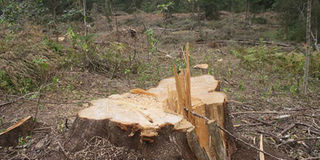Mother nature’s wrath about to boil over, we must act

This image taken on February 14, 2018 shows a section of Aberdare forest where trees have been cut. PHOTO | FILE | NATION MEDIA GROUP
What you need to know:
- Who will protect the environment when we ourselves don’t know how to and are not willing to protect it?
- Development is good but we can still develop, conserve and care for each other.
On Monday, social media was awash with environmental activists criticising the Nairobi County Government for cutting down of trees on Waiyaki Way to pave way for a superhighway.
This is not the first time the county has been called out on this. Previously, trees had been cut down to increase billboard visibility.
More recently, we have seen water wars in several counties, forest wars in the Mau Forest and oil wars in Turkana.
On October 8, the Intergovernmental Panel on Climate Change (IPCC) officially unveiled its latest climate change assessment report.
The report, which is the sixth from IPCC, gave mankind 12 years to solve its carbon problem or be destroyed.
For those asking how they got to 12 years, here’s how. Every year, 41 billion tonnes of Carbon (IV) Oxide (CO2) are added into the atmosphere.
DEPENDENCY
It will take 410 billion tonnes of CO2 to increase the average temperature by 1.5°.
If we do the math, 410 billion tonnes divided by 41 billion tonnes equals 10 years. Assuming some of us decide to take this report seriously and do something about it, we will get an additional two years and that will bring the total to 12 years.
The report is also a reminder of what the narrator of an environmental documentary called “Bag It” once said: “Nature has a way of solving its problems. If we are the problem, it will solve us.”
Environment, development and politics are intertwined. Our economy is based on the environment. It is from it that we get the raw materials – the foundation – of everything we have and call development.
Environmental protection and responsible development is determined by the kind of leadership we have and the leadership we have is determined by the kind of politics citizens decide to entertain.
RESOURCES
Kenya doesn’t have to wait 12 years to be hit by this catastrophe. At the moment, we are faced with unprecedented environmental degradation.
Conflicts over natural resources are becoming increasingly common. It is now no longer a matter of ‘if’ one day people will kill each other over water but rather ‘when’.
Efforts to retain what has been left of our environment, even as we try to develop and reverse what we have destroyed, have been met with resistance.
When it is a fact that drastic measures have to be taken to save the Mau Forest, we saw our leaders turn these environmental measures into political issues.
When we complained about the cutting down of trees for billboards, the response was that the firms involved would face the law.
How about the Lamu Coal Plant? We were told we need coal energy to develop.
Questions: Who will protect our environment when the people charged with taking care of it are the ones destroying it with their words and actions?
CONSERVE
Who will protect the environment when we ourselves don’t know how to and are not willing to protect it?
Who’s thinking about the people? Greed for power and money have blinded us to the realities around us. We have made it our goal to fend for ourselves.
What we forget is that a time will come when the poverty facing the masses will be the rich people’s problem too.
No gate will be high enough to keep them out. So, does this mean we shouldn’t grow our country? Absolutely not!
Development is good but we can still develop, conserve and care for each other. The University of Birmingham offers a course: MSc. Environment, Development and Politics.
This is a course that all Kenyans should take. It is of utmost importance that we know how power and politics influence the very fabric of lives.
SHARE
The Bible says people perish for lack of knowledge. If we know, no one will embroil us in empty politics.
If piping water to Nairobi means leaving people in Murang’a suffering, we develop policies to share this and other resources.
Not out of pity but as a form of justice. Are they not Kenyans too? And by the way, we didn’t create these resources.
We should also call on our leaders to educate themselves on these issues so that they can speak with wisdom.
Ms Wanjohi is the founder, Mazingira Safi Initiative. [email protected]





